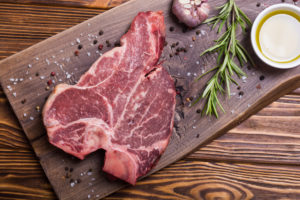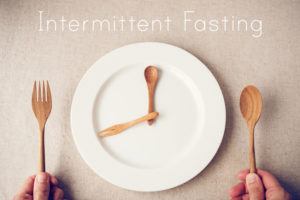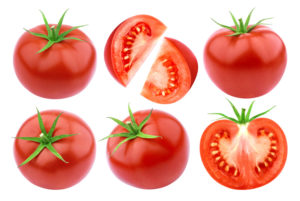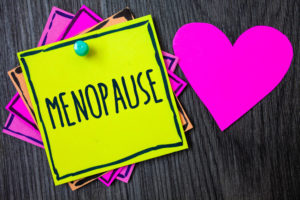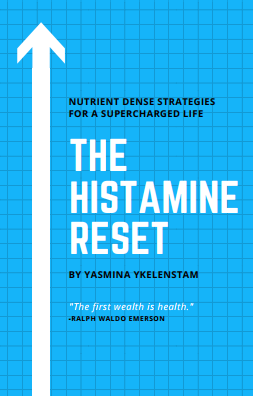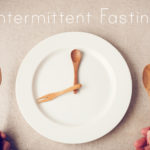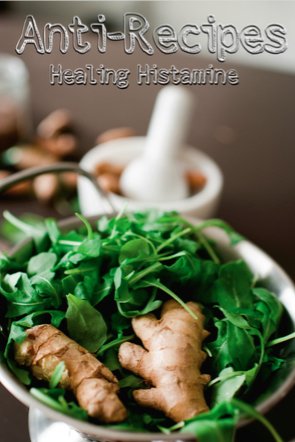
One of the most frustrating things for a histamine intolerance sufferer is the lack of knowledge and understanding amongst medical doctors. Here’s a helpful list of histamine facts and concepts to share so that you and your doctor can work together to get you on the road to healing.
WHAT IS HISTAMINE?
Wikipedia has a good summary of histamine:
Histamine is an organic nitrogenous compound involved in local immune responses, as well as regulating physiological function in the gut and acting as a neurotransmitter for the brain, spinal cord, and uterus. Histamine is involved in the inflammatory response and has a central role as a mediator of itching. As part of an immune response to foreign pathogens, histamine is produced by basophils and by mast cells found in nearby connective tissues. Histamine increases the permeability of the capillaries to white blood cells and some proteins, to allow them to engage pathogens in the infected tissues.
It’s important to note a few things, here: the connection between histamine and the immune system (and therefore, inflammatory response), the connection between histamine and gut function, and the role histamine plays in the brain, as a neurotransmitter.
WHAT DOES HISTAMINE DO?
Histamine has many roles in the body, which range from stimulating the production of stomach acid, to helping with learning and memory, to appetite control, the sleep-wake cycle, and immune function. It’s when histamine levels are out of control and/or it isn’t being broken down normally, that it’s a problem.
That’s when it becomes inflammatory and wreaks havoc on the body, causing a myriad of symptoms. A few of these symptoms mentioned in the American Journal of Clinical Nutrition article mentioned below include diarrhea, headache, asthma, low blood pressure, arrhythmia, hives, itching, and flushing. However, there are many more. You’ll find connections made between histamine and a number of other conditions right here on this blog.
Here’s a post that highlights some of the other symptoms that may accompany histamine intolerance.
ARE THERE ANY STUDIES TO BACK UP HISTAMINE INTOLERANCE AS A REAL CONDITION?
A 2007 article on “Histamine and Histamine Intolerance” in the American Journal of Clinical Nutrition explains that
“Because of the multifaceted symptoms, the existence of histamine intolerance is frequently underestimated, or its symptoms are misinterpreted. Clinical symptoms and their provocation by certain foods and beverages appear similar in different diseases, such as food allergy and intolerance of sulfites, histamine, or other biogenic amines (eg, tyramine).”
A couple of the top researchers in the area of histamine intolerance and mast cell disorders include:
Theoharis Theoharides, MD, Ph.D. Dr. Theoharides is Professor of Pharmacology and Internal Medicine in the Department of Integrative Physiology & Pathobiology at Tufts University School of Medicine and Sackler School of Graduate Biomedical Sciences & Director of Molecular Immunopharmacology and Drug Discovery at Tufts University School of Medicine, Boston, MA. He has published 376 papers and 3 textbooks with 23,637 citations and is in the top 5% of authors most cited in pharmacological and immunological journals. He is continuously funded by the National Institutes of Health and a mast cell expert. His Neuroprotek supplement was created to help mast cell activation patients.
Janice Joneja, Ph.D., RD. Dr. Joneja is owner and operator of Vickerstaff Health Services in British Columbia, Canada. She is a researcher, author, and expert in histamine intolerance. Her Ph.D. is in medical microbiology and immunology and she has over thirty years of experience in the area of biochemical and immune reactions to foods. She is the author of seven books on the immunology behind food allergies and intolerances. Three of these are peer-reviewed textbooks. Her work has been published in peer-reviewed scientific and medical journals, as well as in popular magazines. She is also a registered dietitian (RD).
And here’s Dr. Janice Joneja Histamine Intolerance Interview Pt2.
Check the referenced studies at the end of this post for more resources and evidence of histamine intolerance.
HOW DO YOU TEST FOR HISTAMINE INTOLERANCE?
I’ve been told by a number of doctors that it takes, on average, a decade to diagnose someone with a mast cell disorder. It took me almost 30 years and 68 doctors to get to histamine intolerance, and then another three years and two doctors to get to mast cell activation disorder.
However, now that histamine intolerance is starting to be recognized by functional medicine doctors, nutritionists, and a few informed medical doctors, your road will likely be shorter than mine. Some of these informed medical professionals are now routinely offering tests for histamine intolerance and mast cell disorders. Allergists and immunologists tend to be less aware of histamine intolerance as a separate condition from outright allergies. Some means for diagnosis include the following:
Histamine Plasma Test
What it is: The current level of histamine in your blood.
Why measure it: Histamine intolerance is thought to be due to too much histamine in the body.
Reliability: Not reliable. This test is only a snapshot of where you are at that very moment. Given that histamine is used by the body for a wide variety of purposes (to wake us up, control appetite and metabolism, as a neurotransmitter, and much more), it fluctuates wildly throughout each day. This test will not give an accurate idea of your average histamine levels.
DAO (diamine oxidase) Test
What it is: DAO is an enzyme found in the gut. It’s responsible for degrading histamine there.
Why measure it: the theory is that low DAO makes it hard/impossible to clear histamine from the body, leading to histamine intolerance/symptoms of high histamine.
Reliability: DAO is one of two histamine-degrading enzymes we know of (HNMT being the other), therefore just relying on DAO as a measure isn’t likely to give us the full picture. DAO also fluctuates wildly, and we don’t know where else, other than the gut, DAO might live. For that reason, it’s uncertain whether we’re even measuring it in the right spot!
Elimination Diet
What it is: A four-week elimination of all foods on the high histamine lists.
Why try it: The theory is that no matter the test results, if eliminating these foods makes you feel better, you have your answer.
Reliability: Let’s start with the fact that all high histamine food lists contradict each other, that many high histamine foods are also junk/bad for you generally, so cutting them out would make most people feel better anyway, and that restricting foods is rarely healthy.
Histamine Prick Test
A study on the prick test method to print for your doctor.
What it is: Austrian docs figured out that injecting patients with histamine causes a significant reaction (when compared to controls) and as such is a reliable way to diagnose patients with histamine intolerance.
Why try it: my allergy scratch tests came back negative for years, but docs always commented on my unusually severe response to the control (pure histamine!). I would be very careful if you have ever had major reactions and good luck convincing a doc to do it for you!
Reliability: I can’t really speak to this one as I don’t have enough information on it yet.
There’s no easy answer for diagnosing histamine intolerance. Histamine is released from mast cells, a type of white blood cells which are an important part of our immune system. While histamine is an inflammatory agent that may lead to all kind of aggravating symptoms, it’s not the only inflammatory agent to suspect. And the above tests just check for histamine and histamine-reducing substances.
Avoiding high histamine foods and including plenty of antihistamine foods can help, but the real issue is inflammation in general. And that’s what needs to be addressed for healing to occur.
HOW IS HISTAMINE INTOLERANCE TREATED?
The things that have helped me most in my recovery from histamine intolerance include not only avoiding high histamine foods and histamine-releasing foods but also adding in particular foods and lifestyle interventions that lower my inflammatory load.
Most practitioners are going to suggest a histamine-free or low histamine diet.
To start, check out this post for an idea of what foods to avoid all. Then read this interview to learn how lifestyle changes can help histamine intolerance. And check out other posts on this blog to learn about some great antihistamine foods and herbs to add in.
A lot of the histamine puzzle has to do with addressing the chronic stress that is fueling chronic inflammation.
WANT TO GET SOME RESOURCES IN YOUR HANDS IMMEDIATELY?
For delicious recipes including these and other foods with antihistamine and anti-inflammatory properties, check out my cookbooks: Anti-Recipes and The Anti-Cookbook. Or, if you want the Paleo version, there’s The Anti-Cookbook (Paleo).
Or even better, to do a complete reset with recipes and lifestyle strategies to balance histamine levels and get your body on the path to healing, I highly recommend my comprehensive 28-Day Histamine Reset.
———REFERENCES———
Maintz, L., and Novak, N. (2007). Histamine and histamine intolerance.
American Journal of Clinical Nutrition, 85(5), 1185-1196.
Retrieved from: https://www.ncbi.nlm.nih.gov/pubmed/17490952
Panula, P., Chazot, P. L., Cowart, M., Gutzmer, R., Leurs, R., Liu, W. L. S., … Haas, H. L. (2015). International Union of Basic and Clinical Pharmacology. XCVIII. Histamine Receptors. Pharmacological Reviews, 67(3), 601–655. http://doi.org/10.1124/pr.114.010249
Pino-Ángeles, A., Reyes-Palomares, A., Melgarejo, E., & Sánchez-Jiménez, F. (2012). Histamine: an undercover agent in multiple rare diseases? Journal of Cellular and Molecular Medicine, 16(9), 1947–1960. http://doi.org/10.1111/j.1582-4934.2012.01566.x
Wikipedia



